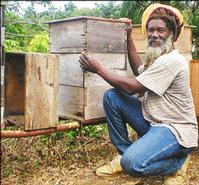'Honeyman' Sydney Davidson reaps sweet rewards
published: Saturday | January 1, 2005
Claudia Gardner, Gleaner Writer

PHOTO BY CLAUDIA GARDNER -
Sydney Davidson arranging colonies at his Maryland property in Hanover, where he keeps bees.
LUCEA, Hanover:
FOR THE past ten years, Sydney Davidson has been keeping bees in the hills of Maryland, Hanover.
Now he manages more than 60 colonies of bees, some of which surround his house in Maryland while the others are kept in the Kew community in Hanover, overlooking the Lucea coastline.
Prior to his engagement in bee keeping, Mr Davidson cultivated yams, dasheens, plantains, bananas and coconuts. But what had stung his interest into bee keeping?
PROFITABLE VENTURE
"It is a very profitable venture because there is a great demand for honey," he said. "So, as you reap the honey, within a short time it is sold off."
He continued that the cultivation of staple was unprofitable in his area because there was a lack of a reliable water system. He also said because of the hilly terrain, it was difficult to get equipment such as tractors to work on his farm.
"I used to plant up to 2,000 hills of yams but it was too much work," he said. "Nowadays, apart from my bees, I only cultivate three acres of coconuts."
Mr. Davidson said every two weeks he checks on his bees to ensure that their conditions are conducive to optimal production.
He said his honey is derived from the nectar of logwood and mango trees, which grow in abundance in the area, and noted that he supplies supermarkets and shops within and outside of the parish.
Mr. Davidson advises that young people engage in bee farming because it was a sure means of earning a tangible income.













